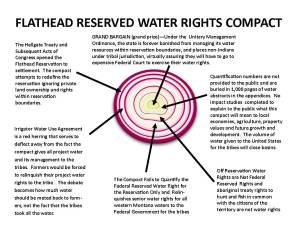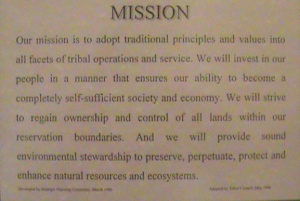© 2013 Concerned Citizens of Western Montana
(Click Here for PDF Copy of Onion Flyer)
This is installment three of a three part series explaining some of the issues and concerns with the existing proposed Flathead Water Compact.
In Part 1 we talked about the recitals and assumptions in the compact that built the foundational structure for the existing compact, a document that will not serve the people of western Montana well and will relinquish most of Montana water to the federal government.
Part 2 discusses the compact commission’s failure to quantify the federal reserved water right only for the reservation, or to provide impact studies and analysis concerning the impacts to property rights and values, local economies, and to future growth and development.
Covered in this article is the most important and egregious aspect of the compact, the document that we believe is the heart of, and the ultimate grand prize for the CSKT leadership: THE UNITARY MANAGEMENT ORDINANCE (UMO).
EXPERIMENTING WITH LIVES, PROPERTY RIGHTS
We are told that the UMO is necessary because in 1996, the Montana Supreme Court created a jurisdictional vacuum on the reservation in its ruling on the Ciotti case. What they fail to mention is that the court ruled:
“The Department of Natural Resources and Conservation (DNRC) cannot process or issue beneficial water use permits on the Flathead Reservation until such time as the prior pre-eminent reserved water rights of the Tribes have been quantified.”
Note, this decision doesn’t say or imply that this situation was permanent, it was only to exist until such time as the reserved water rights of the tribes have been quantified.
The half-truth of a jurisdictional vacuum is a necessary talking point of the compact commission because it serves to advance and justify a document intended to remove citizens and taxpayers of the state of Montana out from under the protections of the state and to place them under tribal jurisdiction for their water needs.
Not convinced? Listen to this 08/2012 audio of commission chairman Chris Tweeten responding to a comment from Jay Weiner. In it, he explains the creation of the UMO, also called the GRAND BARGAIN:
Based on the flawed theories that the Tribes own all the water on the reservation, that all land within reservation boundaries is in reservation status, and there is a regulatory vacuum on the reservation, the Commission allowed the creation of a new administration program for the reservation.
This new system has numerous pitfalls, including:
- The establishment of a political board to control water use and to decide disputes that is likely to be tribally controlled;
- The replacement of the State Water Court with a federal court as the final venue to resolve issues;
- The lack of technical staff and technical criteria by which to make critical water management decisions
- The lack of an implementation plan for the UMO
- The implied taxing authority given to the CSKT
In the same August 2012 commission meeting that the Grand Bargain was revealed, Mr. Tweeten explained that the Compact Commission decided to ‘make permanent’ the Ciotti decision and forever disavow any state authority to administer state water use on the reservation. The decision effectively removes a whole class of citizens out from under the constitutionally-mandated protection of the State…a decision that neither a Commission nor the state Legislature has the authority to make.
TRIBAL OR STATE JURISDICTION?
The new water administration program will affect 23,000 non-members on the Flathead Indian Reservation and extends Tribal jurisdiction over water uses and water use priorities that is unheard of anywhere in the United States.
Jurisdiction has multiple meanings, but basically refers to the governmental authority to control people and property. Under the laws of the United States, tribal jurisdiction over non-tribal members is strictly limited by the United States Supreme Court to certain situations and facts. Water and property rights is not one of them.
All other tribal compacts in the state recognize a dual system of water management where the state manages state based water rights, the federal government manages federal rights and the tribes manage their own water rights. Instead of providing consistency with other compacts, the commission came up with an unprecedented, experimental new water administration program that, if ratified, will circumvent the courts and pave the way for more tribal/federal encroachments on state sovereignty and the individual sovereignty of non-Indians.
To disguise its primarily Tribal purpose and control, this ordinance attempts to mirror state law in a half-hearted attempt to “protect state based water users”, users who will continue to pay property taxes on lands with water rights subjectively controlled by the tribes, and without government representation. In truth, the UMO does not protect anyone’s water right, even individual Tribal members.
So why might this be a problem?
While we cannot presume to know tribal intent concerning the management of water, we can make some educated guesses. Here are just two of many similar statements that serve to give some understanding about where control of reservation waters could be headed:
TRIBAL COUNCIL MINUTES 08/02/12: The Tribal Council and the governor will be appointing the Water Management Board. It puts us on a better level playing field with nonmembers and will protect our instream flows and allow us to have ground water protection areas. It allows us to close surface water diversions. It provides for ongoing development with a smaller water take for each domestic well.
TRIBAL COUNCIL MINUTES 06/21/12: Rhonda Swaney and Mary Price legal department presented for consideration a letter addressed to Chris Tweeten, Reserved Water Rights Compact Commission Chairman, regarding the state of Montana’s proposal on state access to 11,000 acre feet per year of water from Hungry Horse Reservoir. Mary wanted to confirm that there is no interest to provide water for new development for residential, municipal or commercial uses, and the tribe shall retain the right to approve or deny any request from the state to sublease. (Note the Hungry Horse water was eventually included in the compact for all uses except agriculture, but the discourse itself brings into question what the tribe’s intent might be concerning future growth and development.)
Why is this a big deal? Non-Indians cannot participate in tribal government, yet the CSKT are afforded the right to participate in local, state and federal governments in addition to their own. In other words, non-Indians have no voice in tribal government, and their cultural uses and values are different from those of the tribe.
Land without water has no value. The tribe has made it clear they want to reacquire all reservation lands that were removed from tribal ownership and control by the allotment acts. The Unitary Management Ordinance, along with the potential that exists for curtailment of water rights and development, could very well provide a pathway toward achieving this widely acknowledged and recognized tribal agenda.
CSKT Mission Statement from Mission Valley Power Office, Taken 04/2013
WHY DO THEY CALL IT THE GRAND BARGAIN?
For decades the CSKT leadership has used the court system to challenge state authority within reservation boundaries, and to encroach on the sovereignty of private fee land owners within the exterior boundaries of the reservation. To date, most of these attempts have been unsuccessful.
The UNITARY MANAGEMENT ORDINANCE circumvents Montana’s constitution and the courts in a blatant attempt to create precedent that will give the CSKT, a membership organization that consider themselves to be a “sovereign nation”, control over the property use and development on non-members, without regard to private ownership and individual property rights.
The individuals impacted will have no voice in the decisions that are made by a tribally controlled board, and as long as they reside within the exterior boundaries of the Flathead Reservation, they will no longer be under the protection of the laws and the constitution of the state of Montana concerning their water rights.
What a an amazing bargain for the tribe. They get control over all water uses on the reservation in exchange for a promise to kinda, sorta protect existing uses of water, except for irrigators (see Part 2).
THE UNITARY MANAGEMENT ORDINANCE IS ILLEGAL AND UNCONSTITUTIONAL. PLAIN AND SIMPLE, IT IS TAXATION WITHOUT REPRESENTATION.



Excellent post and description. The UMO is an experiment…sure to cause division, loss of property values, water rights, homes, livelihoods. Time for the ‘progressives’–be they tribal or state—to step aside and let real Americans solve this.